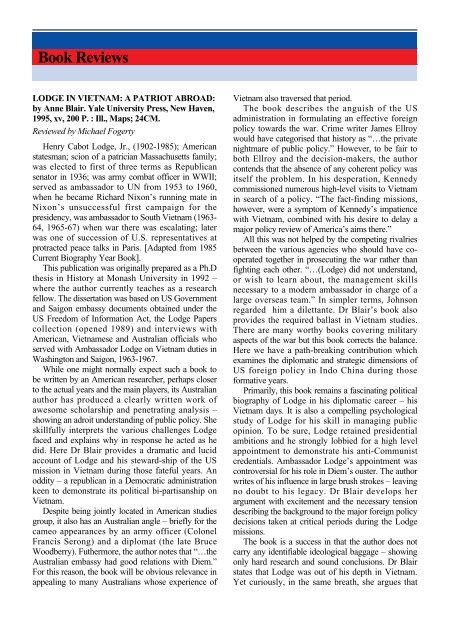ISSUE 125 : Jul/Aug - 1997 - Australian Defence Force Journal
ISSUE 125 : Jul/Aug - 1997 - Australian Defence Force Journal
ISSUE 125 : Jul/Aug - 1997 - Australian Defence Force Journal
You also want an ePaper? Increase the reach of your titles
YUMPU automatically turns print PDFs into web optimized ePapers that Google loves.
Book ReviewsLODGE IN VIETNAM: A PATRIOT ABROAD:byAnneBlair. YaleUniversityPress, New Haven,1995, xv, 200 P. : Ill., Maps; 24CM.Reviewed by Michael FogertyHenry Cabot Lodge, Jr., (1902-1985); Americanstatesman; scion of a patrician Massachusetts family;was elected to first of three terms as Republicansenator in 1936; was army combat officer in WWII;served as ambassador to UN from 1953 to 1960,when he became Richard Nixon’s running mate inNixon’s unsuccessful first campaign for thepresidency, was ambassador to South Vietnam (1963-64, 1965-67) when war there was escalating; laterwas one of succession of U.S. representatives atprotracted peace talks in Paris. [Adapted from 1985Current Biography Year Book].This publication was originally prepared as a Ph.Dthesis in History at Monash University in 1992 –where the author currently teaches as a researchfellow. The dissertation was based on US Governmentand Saigon embassy documents obtained under theUS Freedom of Information Act, the Lodge Paperscollection (opened 1989) and interviews withAmerican, Vietnamese and <strong>Australian</strong> officials whoserved with Ambassador Lodge on Vietnam duties inWashington and Saigon, 1963-1967.While one might normally expect such a book tobe written by an American researcher, perhaps closerto the actual years and the main players, its <strong>Australian</strong>author has produced a clearly written work ofawesome scholarship and penetrating analysis –showing an adroit understanding of public policy. Sheskillfully interprets the various challenges Lodgefaced and explains why in response he acted as hedid. Here Dr Blair provides a dramatic and lucidaccount of Lodge and his steward-ship of the USmission in Vietnam during those fateful years. Anoddity – a republican in a Democratic administrationkeen to demonstrate its political bi-partisanship onVietnam.Despite being jointly located in American studiesgroup, it also has an <strong>Australian</strong> angle – briefly for thecameo appearances by an army officer (ColonelFrancis Serong) and a diplomat (the late BruceWoodberry). Futhermore, the author notes that “…the<strong>Australian</strong> embassy had good relations with Diem.”For this reason, the book will be obvious relevance inappealing to many <strong>Australian</strong>s whose experience ofVietnam also traversed that period.The book describes the anguish of the USadministration in formulating an effective foreignpolicy towards the war. Crime writer James Ellroywould have categorised that history as “…the privatenightmare of public policy.” However, to be fair toboth Ellroy and the decision-makers, the authorcontends that the absence of any coherent policy wasitself the problem. In his desperation, Kennedycommissioned numerous high-level visits to Vietnamin search of a policy. “The fact-finding missions,however, were a symptom of Kennedy’s impatiencewith Vietnam, combined with his desire to delay amajor policy review of America’s aims there.”All this was not helped by the competing rivalriesbetween the various agencies who should have cooperatedtogether in prosecuting the war rather thanfighting each other. “…(Lodge) did not understand,or wish to learn about, the management skillsnecessary to a modern ambassador in charge of alarge overseas team.” In simpler terms, Johnsonregarded him a dilettante. Dr Blair’s book alsoprovides the required ballast in Vietnam studies.There are many worthy books covering militaryaspects of the war but this book corrects the balance.Here we have a path-breaking contribution whichexamines the diplomatic and strategic dimensions ofUS foreign policy in Indo China during thoseformative years.Primarily, this book remains a fascinating politicalbiography of Lodge in his diplomatic career – hisVietnam days. It is also a compelling psychologicalstudy of Lodge for his skill in managing publicopinion. To be sure, Lodge retained presidentialambitions and he strongly lobbied for a high levelappointment to demonstrate his anti-Communistcredentials. Ambassador Lodge’s appointment wascontroversial for his role in Diem’s ouster. The authorwrites of his influence in large brush strokes – leavingno doubt to his legacy. Dr Blair develops herargument with excitement and the necessary tensiondescribing the background to the major foreign policydecisions taken at critical periods during the Lodgemissions.The book is a success in that the author does notcarry any identifiable ideological baggage – showingonly hard research and sound conclusions. Dr Blairstates that Lodge was out of his depth in Vietnam.Yet curiously, in the same breath, she argues that
















